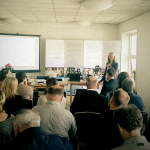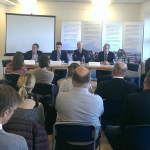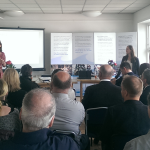On 5 May, exactly 10 years after the official launch, FISH highlighted key achievements and marked the end of the CFP reform and work with OCEAN2012 at a seminar in Stockholm.
At the jubilee seminar on Monday, FISH staff, member organisations and others reviewed and celebrated the work achieved over the past ten years, but most of the time was spent looking forward – into the next ten years.
The Fisheries Secretariat (FISH) was initially set up by the Swedish Anglers Association, the Swedish Society for Nature Conservation and WWF Sweden, modelled on the already existing NGO Secretariat for Acid Rain (now AirClim) and the Chemical Secretariat. It is a non-profit organisation working towards sustainable fisheries in Europe with a strong focus on the Baltic Sea. Our long-term goal is healthy seas with thriving fish stocks and great diversity.
The Stockholm-based Secretariat works towards more sustainable fisheries through information, international co-operation, capacity building and lobbying, with a particular mission to support and help other organisations, as well as the public, with information and knowledge.
– Looking back at all the work we have done over the past 10 years is almost overwhelming. I think we can humbly say that we have achieved what we set out to do so far, if not our long-term goal, says Niki Sporrong, Director at FISH.
The Secretariat has gone from more thematic work in the first few years, to a very strong focus on capacity building in the Baltic Sea region and in Poland in particular. From the very beginning – a high-level conference reflecting on the previous CFP reform in 2004 – regional management and regionalization has been a core issue. Over the past 5 years, a great deal of time has been spent on achieving an ambitious 2012 CFP reform – work that took us all the way into 2014.
FISH was one of the six founding members of OCEAN2012 – analliance dedicated to transforming the EU Common Fisheries Policy in order to stop overfishing, end destructive fishing practices and deliver fair and equitable use of healthy fish stocks. Since then, the coalition has grown to 190 member organisations, across the EU and globally. All have worked tirelessly with the reform, and while things can always be better and more ambitious, the alliance has had an influence and now see some real results of that work.
Looking forward
An invited panel consisting of Magnus Kindbom, State Secretary at the Ministry of Rural Affairs, Christofer Fjellner, MEP (EPP, SWE), Lars Tysklind, Member of the Swedish Parliament (Swedish Liberal Party) and Reine Johansson, Chair of the Baltic Sea Advisory Council, was asked to reflect on what they believe will be the most important issues in the coming years and what the future role of FISH should be.
Before launching into the future, several panelists emphasized the crucial role that civil society organisations have played in the now concluded reform. Lars Tysklind and Christofer Fjellner also emphasized the need to follow the implementation of the new CFP, making sure that what has been agreed is actually implemented. The work of FISH and other civil society organisations provides vital information and advice to decision-makers forced to deal with a huge range of issues.
All the panelists highlighted the importance of dialogue, and how it will need to be both broadened and deepened as part of the regionalization process. With its history of capacity building and knowledge sharing, FISH has an important role to play in this process in the Baltic Sea region.
Reine Johansson, Chair of the Baltic Sea Advisory Council, commended FISH for its long term engagement in the EU regionalisation process, especially in the Baltic Sea Region, and stressed the importance of keeping up this work. He also reflected on the developments of the Baltic Sea RAC and BALTFISH, and the need for decision-makers, scientists and stakeholders to work together to find solutions. His vision was a broader based Baltic body in 2020.
Magnus Kindbom highlighted the importance of sharing a common understanding of the new policy adopted in the reform, and that he believes FISH have a role to play over the next 10 years ensuring that “sustainable fishereies” means the same in different countries.
Mikael Karlsson, President of the Swedish Society for Nature Conservation, closed the seminar with some final remarks, based on his organisation’s experience with all of the Swedish NGO Secretariats. All of them had at some point considered whether their work was done – as one could do with a successful CFP reform just concluded – but so far this has always turned out to be premature. Often the bulk of the work starts with implementation. He also emphasized the need for strong civil society organisations in democracy and the decision-making system.
After the seminar, which took place at Kulturfyren – the former “Mindepartementet” (an old Navy building) at the heart of Stockholm – participants celebrated with food and lovely views of the Stockholm waters.


